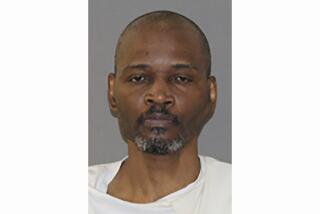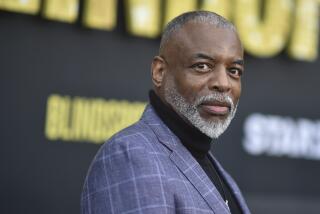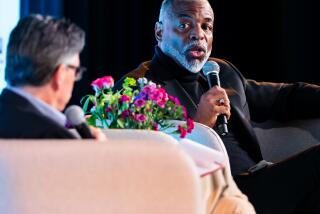Accident Fails to Keep Student From Dream of Being a Doctor
- Share via
Like most soon-to-graduate medical students, David Burton is an intelligent, self-assured, well-motivated individual.
But unlike his colleagues at the UC San Diego School of Medicine, Burton has an additional characteristic that distinguishes his developing career: he is disabled, confined to a wheelchair as a result of an automobile accident in 1983 that left him paralyzed below the chest.
There are doctors who practice medicine--and do well in their profession--despite having confining disabilities. But almost all of them chose specialties that do not involve hands-on patient care, and most became disabled after completing the often-grueling physician training that follows graduation from medical school.
The 29-year-old Burton is taking a much more uncommon path, one he hopes will bring not only professional satisfaction for him but show the public what a disability means and does not mean in terms of handicapping a career.
Burton plans to practice primary ambulatory care for adults in a private-practice setting. And Burton takes a major step toward that goal in mid-June when he begins a three-year residency training program in internal medicine at Mercy Hospital in San Diego, one of the nation’s most prestigious post-doctorate educational programs.
Burton’s acceptance by Mercy culminates a remarkable 2 1/2 years since his auto accident, during which he has made great physical progress in recovering from near-total paralysis and learned--with the help of several key people along the way--that his permanent disability did not mean an end to his medical career.
“This guy is a super-bright kid,” said Dr. Vernon Nickel, orthopedic surgeon in residence at UCSD Medical Center and director of the rehabilitation clinic at Sharp Memorial Hospital. “He has shown that (ability) by being a full year ahead of what you would expect from someone recovering from such a devastating paralysis.”
Nickel helped guide Burton’s physical therapy and--more important in Burton’s view--boosted his spirits by telling him more than once that the accident would not limit his hopes to be a doctor.
“His record at medical school has turned out to be outstanding,” Nickel said.
The head of Mercy’s program, Dr. Charles Miller, said that he and his staff first asked themselves how Burton would rank if he had no handicap, and that Burton ranked “very, very high.” They already had observed him working at Mercy as part of the fourth-year UCSD Medical School rotation.
“Sure, he has to work harder to get around, and some technical things will be more difficult for him, but I have faith in him, because of what he already has done, and expect he will carry his share of the load, just like any other resident,” Miller said.
Burton, who graduates from medical school in June, confesses to his share of butterflies as he enters the rigorous Mercy program, wanting to be convinced that he “can do the care 100% (despite being in a wheelchair), and that I can survive the 80-hour weeks.”
But Burton admits to great satisfaction at how far he has come from that point in December, 1983, when he lay paralyzed in an intensive care ward at the UCSD Medical Center, wondering whether his lifelong goal of becoming a doctor was no longer realizable.
Burton had fallen asleep at the wheel while driving himself and a fellow third-year medical student to a ski resort in Utah the day after the beginning of winter break. He drove off the freeway near the Nevada-Utah border, crushing his spine, breaking his neck, and suffering severe internal injuries. Had he been wearing a seat belt, Burton realizes, he would have escaped, as his friend did, with only minor cuts and bruises.
“I had pretty much always wanted to be a doctor,” Burton recalled. “My mom has been a nurse for almost 25 years, and she worked a long time for a family practice doc who really came close to being a true-life Marcus Welby.”
For Burton, his dream appeared destroyed when he first became aware of his surroundings in intensive care, a couple of days after the accident, after he had been transferred by air from a community hospital in Las Vegas. Given his medical school training, Burton knew that his injury was severe.
“After two weeks, I knew that the paralysis was permanent,” he said. “By that time, spinal shock (non-permanent paralysis as opposed to spinal injury) goes away. I definitely was sure I couldn’t be a doctor; I couldn’t get up in bed to dress myself, I couldn’t even get into the sitting position.”
Even after Nickel first visited him in intensive care and told Burton that he could recover, Burton had his doubts. Nickel was a longtime family friend and had been asked by Burton’s mother to help. Nickel has a longstanding national reputation for handling debilitating spinal injuries; he has headed the highly-regarded Rancho Los Amigos hospital in Los Angeles County for many years.
“Nickel came in with a voice of authority and told me he had seen hundreds of injuries like mine and told me there was no reason I could not become any type of doctor,” Burton said. “He really did get me psyched up to try and get my life going again, even when I really didn’t believe him.”
Says Nickel today: “His care at UC was incredibly good, because the orthopedic surgeons stabilized him aggressively and probably prevented David from being paralyzed from the neck down.
“I’m a very positive person and knew of other students who had finished despite spinal chord injuries. But David is incredibly strong, and despite all his severe medical problems, he had an incredibly short hospital stay, only two months, and really did a lot of his rehabilitation himself.”
Burton praised both his surgeons and fellow medical students for not pretending he was better off than he was during his hospital stay and for their steady encouragement. By the time he was released from the hospital in early 1984, Burton said, he had been overwhelmed with information showing him that he could still be a doctor.
“Even when I still had not learned how to control my bowel and bladder, when I still was not strong, I had difficulty with the car, I could barely get into the wheelchair from bed, I had encouragement that I could get back to school,” Burton said.
At first, Burton thought that he would be able only to pursue a specialty not dealing directly with patients, such as pathology or psychiatry, despite his desire to do clinical care. After he returned to school to complete the third year, Burton began a period of surgical training where he was clearly placed only as an observer.
“I was really discouraged,” he said. “I knew physically I could not be doing surgery and I doubted whether I could ever be a primary care-giver.”
At that point, several UC physicians contacted Dr. Linda Olson, assistant clinical professor of radiology, and asked her to talk with Burton. As soon as Burton met Olson, he found himself “injected with new enthusiasm” and determined to work harder. Olson is a triple amputee from a serious train accident in Austria.
“She got me working on radiology in the emergency room and showed me that I could do a lot of things physically,” Burton said.
Olson said that her best advice to Burton was to keep working toward becoming a physician and not allow the perceptions of others to derail the goal. “And when you are disabled, people tend to focus on your disability. If you can become a doctor, that is a good way of fighting back against that view because even if you are in a wheelchair, you have the blanket of that professional status since people tend to look up to physicians.”
Burton gained even more confidence after working a rotation which involved performing physical exams. While he takes longer to complete an exam because of the need to reposition himself, Burton found that he could do the work more than adequately.
With few exceptions, such as being able to stand over a patient at the foot of a bed and perform some procedures, Burton will be able to do almost any clinical function required of an internist, Miller of Mercy Hospital said.
“And in an emergency situation, there are always other people around to do the few things that David won’t be able to do. Such as with anesthesia, he can’t get around to the end of the bed but he can read the (heart-monitoring) strip or manage the drug (dose) and those things are very, very important.”
During his last year in medical school, Burton also learned that he could survive the long hours required of interns and residents, often approaching 80 hours or more a week. Because of the lack of sensation in his lower body, the muscles atrophy and the skin can break down, resulting in chronic infections if he is not careful to change position frequently. Although Burton still worries about his tolerance to sit long hours on end, his initial experiences proved reassuring.
To build his stamina, Burton exercises by wheeling himself from Pacific Beach to Mt. Soledad in La Jolla.
“I don’t think he will have any problems as long as he will allow himself to be human,” said Mary Baldwin, a Sharp rehabilitation nurse specialist who has worked with Burton. “He has to allow other people to help him at times. The problem is that most doctors are perfectionists and David is well at the top of the list.”
Burton also has considered specializing in psychiatry should an unforeseen problem occur during his internal medicine training. During a rotation at the UCSD outpatient psychiatric clinics, Burton found that patients opened up to him quickly because they saw his disability. “Somehow it seemed to make the therapy go better, it made the sessions more direct, more open, in that the patients understood that I had gone through something traumatic.”
Miller said that a patient sees Burton and knows, “Hey, this guy understands illnesses since he has been sick himself, and therefore the patients will understand and appreciate him better.”
Burton said that his often-difficult rehabilitation process has taught him to have more empathy for patients.
“After the accident I became more than just a medical student thinking about how to get through training,” Burton said. “I’ve now seen how effective a single person can be in intervening in a person’s life, as people have in mine, and how I will now be in the key position as a doctor to intervene and make a difference.
“I think it makes medicine a lot more fun now.”






